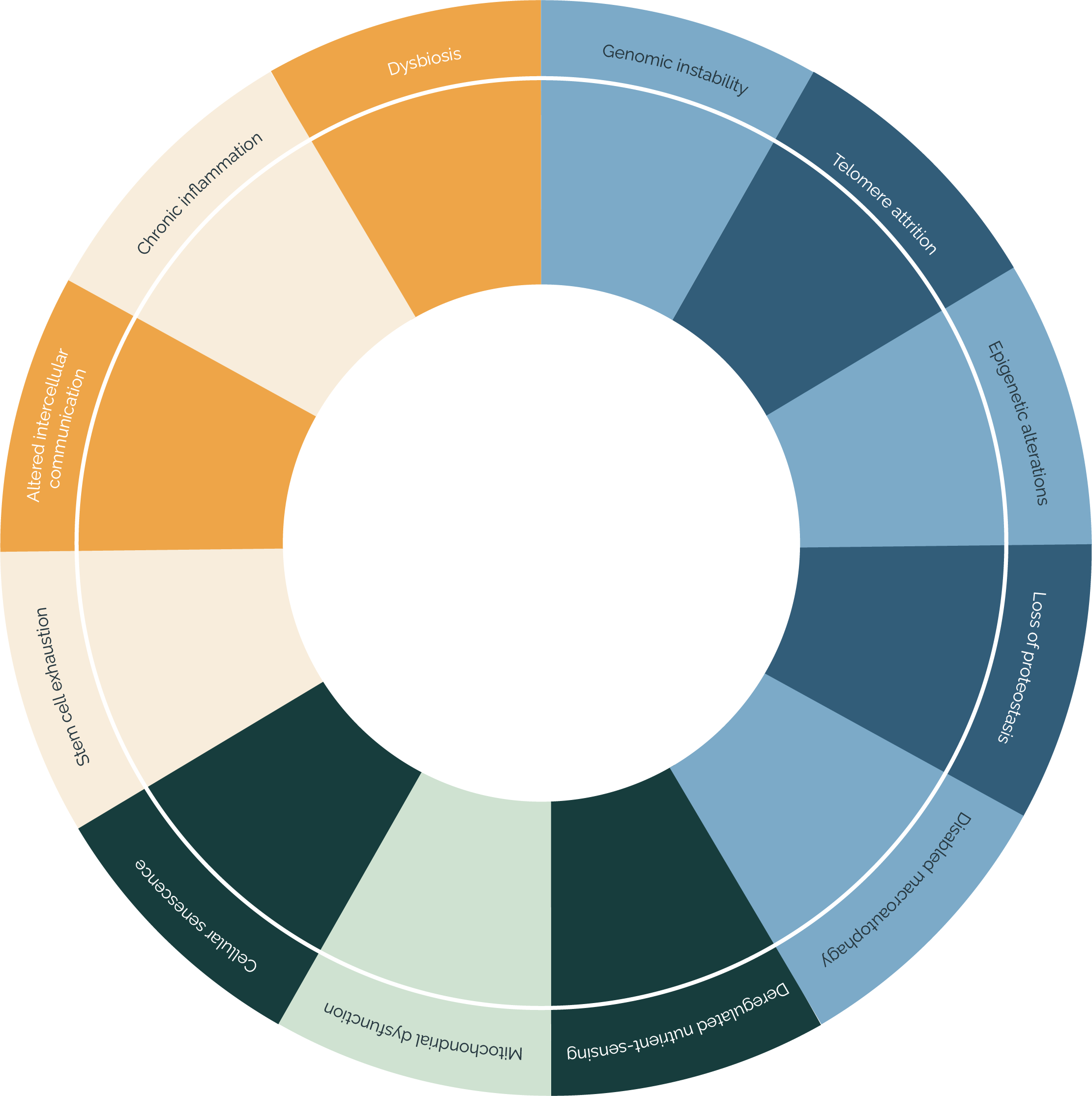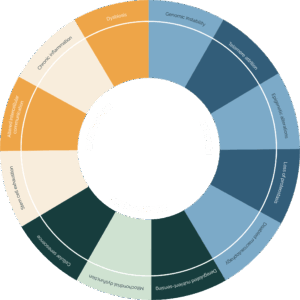Learn about Biological Aging
An indicator of your cellular age
Unlike your chronological age, which you find in your passport, your biological age is based on your overall health (1). Biological age describes how rapidly your body ages based on biological changes like cellular damage. It is a number that matches the average age of people in a group who experience similar biological changes.
Sometimes biological and chronological age are the same, but we know that people age at different rates based on their genetic makeup, environment, and lifestyle choices (2) – (3).

What is aging?
According to the latest perspectives, aging is defined as the process of accumulation of damage in our bodies (1). Aging is closely linked to chronic diseases, muscle weakness, impaired cognitive performance, cancer, and a worsening general condition (2). With the help of the right knowledge and tools, we can reduce the risk of many of these diseases.
Why do we age?
There are different theories attempting to explain why we age (4).
Most of them derive from the principle that the force of natural selection declines with increasing age as evolution prioritizes maintaining health for reproduction and childcare. Once we have passed that period, our functional decline begins.
The good news is that with advances in science and a focus on prevention and healthy living, we have the power to delay the period of physical decline, increase our health span, and make our lives more vibrant and fulfilling.

What is aging?
According to the latest perspectives, aging is defined as the process of accumulation of damage in our bodies (1). Aging is closely linked to chronic diseases, muscle weakness, impaired cognitive performance, cancer, and a worsening general condition (2). With the help of the right knowledge and tools, we can reduce the risk of many of these diseases.
Why do we age?
There are different theories attempting to explain why we age (4).
Most of them derive from the principle that the force of natural selection declines with increasing age as evolution prioritizes maintaining health for reproduction and childcare. Once we have passed that period, our functional decline begins.
The good news is that with advances in science and a focus on prevention and healthy living, we have the power to delay the period of physical decline, increase our health span, and make our lives more vibrant and fulfilling.
Your lifestyle affects your biological age
Your biological age is largely influenced by your lifestyle (2). Lifestyle factors such as exercise, diet, and sleep are crucial for your body’s aging process. Stress is also an important contributor to your biological age, and it can affect your cognitive health (2). Lifestyle also contributes to how genes are expressed. This is described further by the term epigenetics.


Your lifestyle affects your biological age
Your biological age is largely influenced by your lifestyle (2). Lifestyle factors such as exercise, diet, and sleep are crucial for your body’s aging process. Stress is also an important contributor to your biological age, and it can affect your cognitive health (2). Lifestyle also contributes to how genes are expressed. This is described further by the term epigenetics.
Measuring biological age
There are several different ways to measure your biological age. At NEM, we use reliable, evidence-based methods based on epigenetics. Through epigenetic clocks, it’s possible to measure the methylation of your DNA, which enables the determination of biological age (2). Our physicians use this measurement to evaluate your health progress.
Curious to explore the range of tests we offer?

Hallmarks of Aging
The science of aging
The body’s aging mechanisms have been studied extensively and are collectively known as the “Hallmarks of Aging” (5). When initially described in 2013, these mechanisms consisted of 9 biological processes that occur at the cellular level and affect the aging of the body. Almost a decade later, as a result of extensive research in the field of aging, five additional hallmarks were identified and added (4).
By understanding the mechanisms behind aging, we can work preventively to reduce the risk of disease and live healthier lives. This understanding is especially an important framework in research on aging and drug development. If you would like more in-depth knowledge on how aging happens at the cellular level, we recommend reading our articles about the Hallmarks of Aging.
Hallmarks of Aging
The science of aging

The body’s aging mechanisms have been studied extensively and are collectively known as the “Hallmarks of Aging” (5). When initially described in 2013, these mechanisms consisted of 9 biological processes that occur at the cellular level and affect the aging of the body. Almost a decade later, as a result of extensive research in the field of aging, five additional hallmarks were identified and added (4).
By understanding the mechanisms behind aging, we can work preventively to reduce the risk of disease and live healthier lives. This understanding is especially an important framework in research on aging and drug development. If you would like more in-depth knowledge on how aging happens at the cellular level, we recommend reading our articles about the Hallmarks of Aging.
Get the tools to stay healthy, longer
Every human being is unique. Hence, there is no generic recipe for how we should live to remain biologically younger. At NEM, we do not only measure your biological age, but we rather use it as a tool to understand your health and your needs. Together with your personal longevity physician, we develop a tailored framework for you based on, among other things, your biological age, blood tests with 57 carefully selected markers, a genetic mapping of your DNA, and a smart lifestyle questionnaire*. By interpreting clinical findings and your biometric data, your personal physician creates an individual health plan with advice on nutrition, sleep, supplements needed, exercise, and behavioral change. With continuous physician consultations and blood sampling, you create new and sustainable habits for a healthier life.
References
- Moqri M, Herzog C, Poganik JR, Biomarkers of Aging Consortium, Justice J, Belsky DW, et al. Biomarkers of aging for the identification and evaluation of longevity interventions. Cell. 2023 Aug 31;186(18):3758–75.
- Human age reversal: Fact or fiction? – Johnson – 2022 – Aging Cell – Wiley Online Library [Internet]. [cited 2023 Nov 15]. Available from: https://onlinelibrary.wiley.com/doi/10.1111/acel.1366
- Sebastiani P, Perls TT. The Genetics of Extreme Longevity: Lessons from the New England Centenarian Study. Front Genet. 2012 Nov 30;3:277.
- Schmauck-Medina T, Molière A, Lautrup S, Zhang J, Chlopicki S, Madsen HB, et al. New hallmarks of ageing: a 2022 Copenhagen ageing meeting summary. Aging. 2022 Aug 29;14(16):6829–39.
- López-Otín C, Blasco MA, Partridge L, Serrano M, Kroemer G. The Hallmarks of Aging. Cell. 2013 Jun 6;153(6):1194–217.

